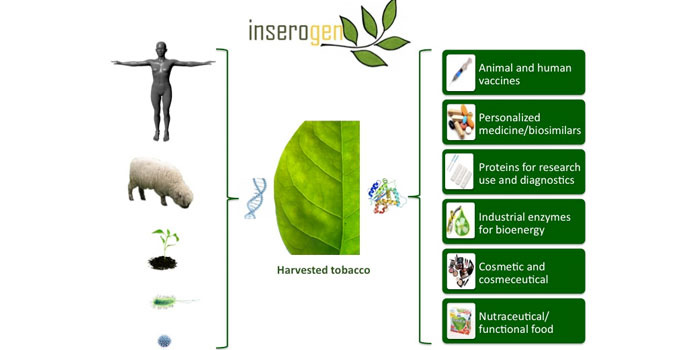Tobacco Plants Turn into Living Vaccine Factories

Tobacco use is responsible for almost half a million deaths in the U.S. each year, but the tobacco plant could find redemption as a savior for public health. That's because a U.S. biotechnology startup has transformed tobacco plants into living factories for making new vaccines and medical treatments.
The "SwiftVax" tobacco plants are designed to act as quick, cheap biological factories for churning out bioengineered proteins needed for human or animal vaccines. Faster vaccine manufacturing could allow the world to respond rapidly to future outbreaks of infectious diseases — a problem it faced while racing to stockpile vaccine during the H1N1 swine flu pandemic.
"Thousands of lives and millions of dollars were lost because current technologies for production were not able to provide vaccines fast enough," said Lucas Arzola, a Ph.D. candidate in chemical engineering at the University of California, Davis. "The use of tobacco plants as biofactories of vaccines can provide a solution to this problem."
Arzola's startup, called Inserogen, has already begun lining up bioengineered products made by the SwiftVax tobacco plants. First, it's creating a vaccine for the poultry illness called Newcastle disease — an infectious disease capable of rapidly spreading among chickens or other farm birds.
Second, a therapeutic protein called alpha-1 antitrypsin (AAT) could help human patients suffering from the genetic disorder known as AAT deficiency, because the missing protein typically protects the lungs and liver from damage. But Arzola envisions the SwiftVax technology making a wide variety of vaccines and proteins used in medical treatments.
"The technology is easy to customize, and can be engineered to produce not only vaccines, but virtually any recombinant protein," Arzola told InnovationNewsDaily. "A unique aspect of our technology is that we are repurposing tobacco, a plant that is viewed as negative, for a positive purpose: manufacturing vaccines and therapeutics to improve quality of life."
Arzola originally founded Inserogen alongside fellow Ph.D. candidates Oscar Ortega-Rivera and Michelle Lozada-Contreras, as well as Karen McDonald, a professor of chemical engineering at UC-Davis. Inserogen went on to win first place among 40 teams competing in the Big Bang! Business Plan Competition at UC Davis in 2010.
Get the world’s most fascinating discoveries delivered straight to your inbox.
The startup's breakthroughs have built upon years of funding from the U.S. National Science Foundation — it was accepted into the new Innovation Corps Program that awards a $50,000 grant to university teams. More recently, it received a $20,000 E-Team Grant from the National Collegiate Inventors and Innovators Alliance (NCIIA) to do a proof-of-concept for producing an animal vaccine.
Inserogen will also represent one of 14 student teams participating in the NCIIA's Open Minds exhibition being held at the Exploratorium museum in San Francisco on Friday, March 23. The startup team hopes to share tips with fellow entrepreneurs and perhaps find interested collaborators or investors.
Arzola had several tips for fellow entrepreneurs: build a team with complementary skills, don't be afraid of talking about the startup idea, and get involved with supporting organizations such as NCIIA.
"You must seek advice from experienced individuals who have built a similar company or have commercialized a similar technology or product before," Arzola said. "They have been there, done that, and you can learn a lot from their successes and mistakes. You will be surprised by their willingness to mentor and to provide valuable advice."
This story was provided by InnovationNewsDaily, a sister site to Live Science. You can follow InnovationNewsDaily Senior Writer Jeremy Hsu on Twitter @ScienceHsu. Follow InnovationNewsDaily on Twitter @News_Innovation, or on Facebook.



